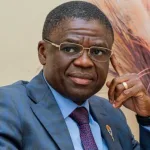The Edo State Government has rolled out modalities for the implementation of the thrice-a-week office work directive by the Edo State Governor, Mr. Godwin Obaseki, as part of efforts to ameliorate the sufferings of the people in the wake of the rise in prices of goods and services and overall cost of living occasioned by the fuel subsidy removal by the Federal Government.
In a meeting with Permanent Secretaries as well as heads of Ministries, Departments and Agencies (MDAs), the Edo State Head of Service, Anthony Okungbowa Esq., said the reduced office workdays will not affect the productivity and efficiency of the Service.
Join our WhatsApp ChannelHe said, “This reduction of work days in Edo State will in no way affect our performance and productivity negatively.”

He continued: “According to the directive of the Governor, workers in Edo State will work three days a week, and offices will not be shut in the two days of the five working days as we would have officers on ground to continue government activities. People should continue to visit government offices as the offices are open for business.
“The template of COVID-19 will be reactivated as offices were not shut, as arrangements are in place for officers to come to work, ensuring government activities continue provided nobody is forced to work more than three days a week.”
Okungbowa further stated, “For people who want to work for more than three days in a week, they should be allowed to do so as the conducive environment, uninterrupted internet service attracts workers to continue to come to work, and such people will be commended.
“Head of agencies, MDAs, PSs of various ministries should develop the work templates and ensure that what they do works for them and ensure government services are not interrupted.”
On other steps by the government to cushion the effect of the fuel subsidy removal on the people, the Head of Service said, “There will be shuttle buses running between Government House, State Secretariat, and JOOPSA to ease the hike in transportation fare caused by subsidy removal on petrol. The shuttle bus will leave every hour of the workday to help reduce the stress of workers in the State.
“The government has identified eight routes in the City and is putting mechanisms in place to get this working. Mr. Governor has promised to provide buses for all these routes but we will start with four. The buses will pick up workers from these routes to the Secretariat and to other places they work.
“The governor is very much interested in the welfare of Edo workers and the State is the first State to implement the 13th month salary and that will be paid to Edo workers by December. The government also increased the minimum wage in the state by 33.3 percent above what is payable by other State Governments and even the Federal Government.”
He added, “By the 26th of every month, salaries are paid and the government has been consistent with the payment, and also pensions are adequately paid to the retirees and also have begun to pay gratuity.”
The HOS said, “For those on essential duties like doctors, nurses, hospital workers; those in the environment in charge of cleaning as well as pressmen and journalists who will always be on their duty post, they will be considered as the issue will be discussed with the governor and reported back.”

On her part, the Edo SUBEB Chairman, Mrs. Ozavize Salami said the three-day work week will commence in the basic and junior secondary schools in Edo State on June 13, adding, “Mondays, Tuesdays and Wednesdays have been chosen to be the days for our children to go to school while the school will be closed for the other two days.
“Our plan for this period focuses on maximizing e-learning, ensuring the children cover the curriculum they ought to cover. They will stay for six weeks before vacation. For administrative reasons, we have chosen the first three days of the week as students will come to school for the first three days of the week.
She added, “We have increased the learning hours for basic school across the State by one hour and two hours for junior secondary schools to achieve the school curriculum and integrated the timetable for Thursdays and Fridays into Mondays, Tuesdays, and Wednesdays.”
Victor Ezeja is a passionate journalist with six years of experience writing on economy, politics and energy. He holds a Masters degree in Mass Communication.



















Follow Us